Monday, March 18, 2019
LUCOM medical library hosts annual medical bioethics symposium
Mon, 18 Mar 2019Asa Keimig | LUCOM Marketing
 Liberty University College of Osteopathic Medicine (LUCOM) Medical Library hosted their annual Medical Bioethics Symposium on Saturday, March 9, at the Center for Medical and Health Sciences.
Liberty University College of Osteopathic Medicine (LUCOM) Medical Library hosted their annual Medical Bioethics Symposium on Saturday, March 9, at the Center for Medical and Health Sciences.
The topic of this year’s symposium was The Concept of Medical Futility and the Virginia Medical Futility Law and featured keynote speaker Alva B. Weir, III, MD, FACP, president of the Christian Medical and Dental Association (CMDA). Medical Futility is the continuation of providing medical treatment or care to a patient even when there is no hope of cure or improvement. There have been several components of evidence-based medicine that suggest discontinuation of any treatment that hasn’t provided a significant, measurable benefit.
In a recent survey, top medical ethical decisions posed the question, “Would you ever recommend or give life-sustaining therapy when you judged that it was futile?”
Physicians’ Responses
Yes – 23.6%
No – 37%
It Depends – 39.4%
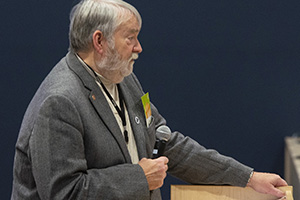 “This is a topic where physicians, lawyers, and patients are all going to have different responses,” said Eugene S. Patterson, PhD, professor of pharmacology at LUCOM. “All three groups do not look at the world the same way and that’s part of the reason as to why there is this law.”
“This is a topic where physicians, lawyers, and patients are all going to have different responses,” said Eugene S. Patterson, PhD, professor of pharmacology at LUCOM. “All three groups do not look at the world the same way and that’s part of the reason as to why there is this law.”
Dr. Patterson introduced Dr. Weir, who as a physician, presented on the topic, What Constitutes Medical Futility. “I’m going to talk to you today about medical futility and I’m going to speak to you as a physician, as a health care professional,” he said. “You’re going to have to learn how to think about this yourself because I have patients all the time who reach the point of their lives where they may be nothing that is really beneficial for them anymore. From there I have to make decisions in community with the family and the hospital with the intent of how do I best manage this patient.”
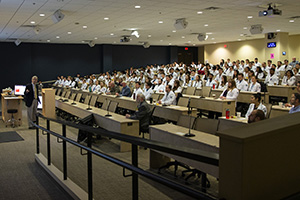 Dr. Weir gave his definition of Medical Futility as, “An intervention is medically futile when it cannot reasonably improve the quality of life for the patient or prolong a life that fulfills the patient’s goals for living.” He views it as his inability to make the patient live longer or improve their overall quality of life. “It’s critical that we’re talking about the value of intervention, not the value of life, and the big question is who decides the value” he added.
Dr. Weir gave his definition of Medical Futility as, “An intervention is medically futile when it cannot reasonably improve the quality of life for the patient or prolong a life that fulfills the patient’s goals for living.” He views it as his inability to make the patient live longer or improve their overall quality of life. “It’s critical that we’re talking about the value of intervention, not the value of life, and the big question is who decides the value” he added.
The major issue behind medical futility is the principle of proportionality. One must compare the burden of the intervention, which would be the cost to the patient, the well-being of the family, and the cost to society, with the potential benefit to be achieved to the patient in front of you. “You have to compare the burden of intervention versus the benefit to be achieved,” said Dr. Weir.
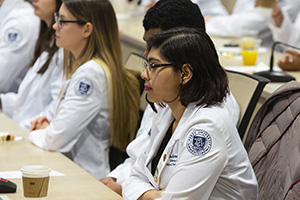 In regards to medical futility there are three parties involved: patients, clinicians and society. Patients are receiving care consistent with their values and preferences, clinicians are acting within their best understand of their professional obligations, and society is protecting individual rights by fostering clinician professionalism which, insures fair allocation of medical resources.
In regards to medical futility there are three parties involved: patients, clinicians and society. Patients are receiving care consistent with their values and preferences, clinicians are acting within their best understand of their professional obligations, and society is protecting individual rights by fostering clinician professionalism which, insures fair allocation of medical resources.
“Our responsibility to our patients is excellent medical care that entails beneficence, non-maleficence, justice, autonomy in decision making, whole person medicine, wisdom and a covenant relationship,” said Dr. Weir.
Following Dr. Weir’s presentation, Dr. Patterson led a breakout session on The Medical Ethic Response – Virginias Medical Futility Legislation. “The Virginia Medical Futility Law took effect on the first of July in 2018 and is modeled after the Texas Directives Act passed in the state of Texas in 1999,” he said. “It is legislation that has been established to where a physician may stop providing health care that is medically or even ethically inappropriate for a patient.”
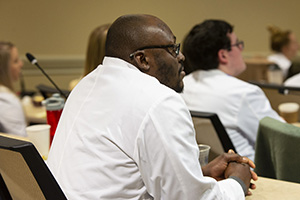 Baruch Brody, PhD, and Amir Halevy, MD, in a published medical journal prosed four distinct categories of medical futility: Physiological Futility, Imminent-Demise Futility, Lethal-Condition Futility and Qualitative Futility. “The definitions from Drs. Body and Halevy are descriptive and useful for discussion from an academic standpoint, but they fail to provide the simplicity needed for a satisfactory and useful legal-ethical definition,” said Dr. Patterson. “These types of decisions need to be made in community with the family, not solely by the physician.”
Baruch Brody, PhD, and Amir Halevy, MD, in a published medical journal prosed four distinct categories of medical futility: Physiological Futility, Imminent-Demise Futility, Lethal-Condition Futility and Qualitative Futility. “The definitions from Drs. Body and Halevy are descriptive and useful for discussion from an academic standpoint, but they fail to provide the simplicity needed for a satisfactory and useful legal-ethical definition,” said Dr. Patterson. “These types of decisions need to be made in community with the family, not solely by the physician.”
The recently passed Virginia law protect the interests of the hospital, the physician and the patient. It maintains for the right of conscience of a physician not to provide life-sustaining therapy that the physician believes to be medically or ethically inappropriate. A physician’s medical decision is reviewed by a second physician, reviewed by an interdisciplinary medical committee, and the interdisciplinary committee’s decision is entered into the patient’s medical record.
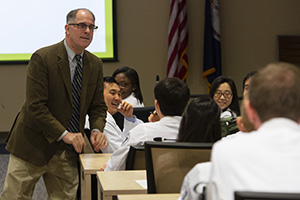 At the conclusion of Dr. Patterson’s presentation, a short break was issued before participants returned to hear Philip Kline, JD, assistant professor of law at Liberty University School of Law (LUSOL). He spoke on the Legal Pros and Cons to Virginia’s Medical Futility Legislation.
At the conclusion of Dr. Patterson’s presentation, a short break was issued before participants returned to hear Philip Kline, JD, assistant professor of law at Liberty University School of Law (LUSOL). He spoke on the Legal Pros and Cons to Virginia’s Medical Futility Legislation.
“As you’ve probably learned there’s a legal concept that is being elevated to the highest level of medical ethics called autonomy,” said Kline. “Patient Autonomy, it’s been around a long time and it’s why you have to get a patient’s consent before you perform a procedure. There is another legal concept that has been around a long time, and it’s your right to refuse and it’s if you feel that your services violate your ethics or morals.”
“It’s difficult to talk about refusing to provide life-saving medical treatment without understanding how we got here to begin with,” said Kline. He provided a legal history that involved a philosophical framework integrated with a theological belief.
“Is it possible that our fears and prejudices limit our compassionate outreach to the disabled,” Kline asked.
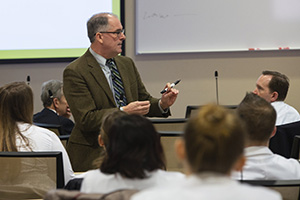
Kline instructed participants that by statute, states allow individuals to express their desires for treatment or non-treatment in living wills and advanced medical directives. Generally, that care may be refused by the newly incompetent, if they’ve previously expressed a desire to refuse care in the present medical condition. The respect for autonomy often clashes with a moral obligation to recognize the intrinsic value of every human being and to not weight that value based on “quality of life.”
At the conclusion of the symposium, participants watched, “A Faith that Allows Dying,” a video by John Patrick.
The Medical Bioethics Symposium was attended by Liberty osteopathic medical and nursing students, law students, public health students, practicing physicians, medical professionals and assistants.